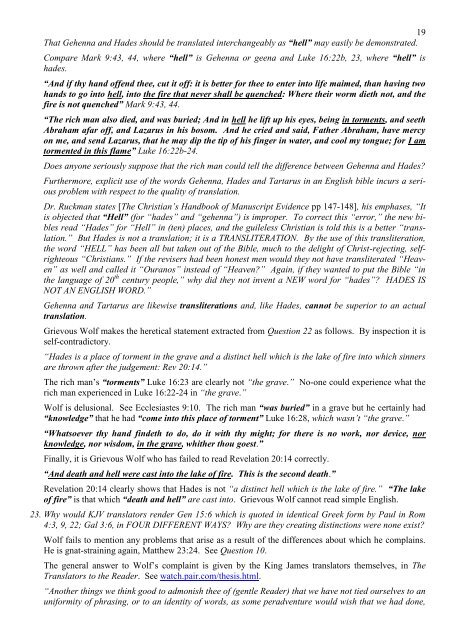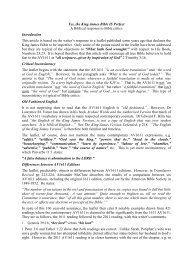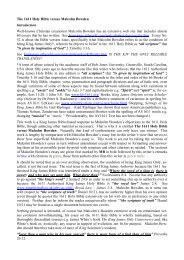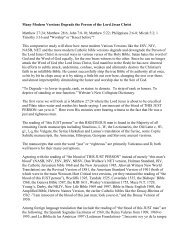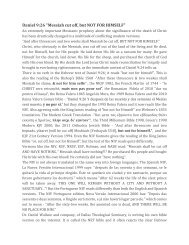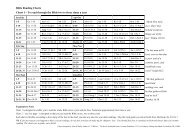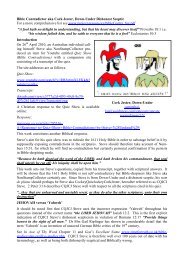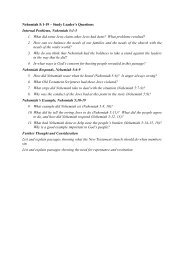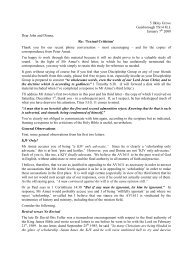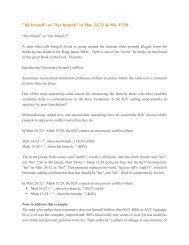A Grievous Wolf - Time for Truth
A Grievous Wolf - Time for Truth
A Grievous Wolf - Time for Truth
You also want an ePaper? Increase the reach of your titles
YUMPU automatically turns print PDFs into web optimized ePapers that Google loves.
19<br />
That Gehenna and Hades should be translated interchangeably as “hell” may easily be demonstrated.<br />
Compare Mark 9:43, 44, where “hell” is Gehenna or geena and Luke 16:22b, 23, where “hell” is<br />
hades.<br />
“And if thy hand offend thee, cut it off: it is better <strong>for</strong> thee to enter into life maimed, than having two<br />
hands to go into hell, into the fire that never shall be quenched: Where their worm dieth not, and the<br />
fire is not quenched” Mark 9:43, 44.<br />
“The rich man also died, and was buried; And in hell he lift up his eyes, being in torments, and seeth<br />
Abraham afar off, and Lazarus in his bosom. And he cried and said, Father Abraham, have mercy<br />
on me, and send Lazarus, that he may dip the tip of his finger in water, and cool my tongue; <strong>for</strong> I am<br />
tormented in this flame” Luke 16:22b-24.<br />
Does anyone seriously suppose that the rich man could tell the difference between Gehenna and Hades?<br />
Furthermore, explicit use of the words Gehenna, Hades and Tartarus in an English bible incurs a serious<br />
problem with respect to the quality of translation.<br />
Dr. Ruckman states [The Christian’s Handbook of Manuscript Evidence pp 147-148], his emphases, “It<br />
is objected that “Hell” (<strong>for</strong> “hades” and “gehenna”) is improper. To correct this “error,” the new bibles<br />
read “Hades” <strong>for</strong> “Hell” in (ten) places, and the guileless Christian is told this is a better “translation.”<br />
But Hades is not a translation; it is a TRANSLITERATION. By the use of this transliteration,<br />
the word “HELL” has been all but taken out of the Bible, much to the delight of Christ-rejecting, selfrighteous<br />
“Christians.” If the revisers had been honest men would they not have transliterated “Heaven”<br />
as well and called it “Ouranos” instead of “Heaven?” Again, if they wanted to put the Bible “in<br />
the language of 20 th century people,” why did they not invent a NEW word <strong>for</strong> “hades”? HADES IS<br />
NOT AN ENGLISH WORD.”<br />
Gehenna and Tartarus are likewise transliterations and, like Hades, cannot be superior to an actual<br />
translation.<br />
<strong>Grievous</strong> <strong>Wolf</strong> makes the heretical statement extracted from Question 22 as follows. By inspection it is<br />
self-contradictory.<br />
“Hades is a place of torment in the grave and a distinct hell which is the lake of fire into which sinners<br />
are thrown after the judgement: Rev 20:14.”<br />
The rich man’s “torments” Luke 16:23 are clearly not “the grave.” No-one could experience what the<br />
rich man experienced in Luke 16:22-24 in “the grave.”<br />
<strong>Wolf</strong> is delusional. See Ecclesiastes 9:10. The rich man “was buried” in a grave but he certainly had<br />
“knowledge” that he had “come into this place of torment” Luke 16:28, which wasn’t “the grave.”<br />
“Whatsoever thy hand findeth to do, do it with thy might; <strong>for</strong> there is no work, nor device, nor<br />
knowledge, nor wisdom, in the grave, whither thou goest.”<br />
Finally, it is <strong>Grievous</strong> <strong>Wolf</strong> who has failed to read Revelation 20:14 correctly.<br />
“And death and hell were cast into the lake of fire. This is the second death.”<br />
Revelation 20:14 clearly shows that Hades is not “a distinct hell which is the lake of fire.” “The lake<br />
of fire” is that which “death and hell” are cast into. <strong>Grievous</strong> <strong>Wolf</strong> cannot read simple English.<br />
23. Why would KJV translators render Gen 15:6 which is quoted in identical Greek <strong>for</strong>m by Paul in Rom<br />
4:3, 9, 22; Gal 3:6, in FOUR DIFFERENT WAYS? Why are they creating distinctions were none exist?<br />
<strong>Wolf</strong> fails to mention any problems that arise as a result of the differences about which he complains.<br />
He is gnat-straining again, Matthew 23:24. See Question 10.<br />
The general answer to <strong>Wolf</strong>’s complaint is given by the King James translators themselves, in The<br />
Translators to the Reader. See watch.pair.com/thesis.html.<br />
“Another things we think good to admonish thee of (gentle Reader) that we have not tied ourselves to an<br />
uni<strong>for</strong>mity of phrasing, or to an identity of words, as some peradventure would wish that we had done,


